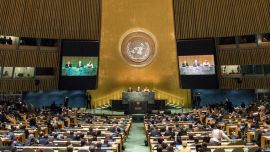Villa 31, one of Buenos Aires' poorest and most densely populated barrios, has shown a spike in the number of Covid-19 infections, worrying authorities hoping to ease the capital's two-month lockdown later this month.
The number of infections in the shantytown, a teeming central district synonymous with violence and poverty, soared from one case at the end of April to 511 by late Tuesday.
To make matters worse, large parts of the barrio were left without water for eight days as people tried to resist the pandemic. Many see it as a continuation of decades of government neglect and discrimination.
"We are screwed because our water has been cut off. I am a domestic worker and I lost my job," said one resident, 37-year-old María Chaile.
In Buenos Aires, only a fraction of the population – mostly essential workers – are out on the streets every day. But in Villa 31, dozens of people like Chaile go about their business as though the pandemic were not happening. The area's shops, small restaurants and hairdressers are open, in contrast to businesses in rest of the city.
Social distancing impossible
Several generations of the same family often live together in the barrio's tiny concrete-block houses, making social distancing impossible.
The shoddily built homes with tin roofs seem precariously piled on top of one another, and are accessed by outside spiral staircases.
Tangled electricity cables – used to illegally tap current from nearby power lines – hang precariously over the narrow streets.
Luis Fernando Guispert, a 28-year-old student, has lived in Villa 31 since his family moved here from Bolivia when he was two.
"The number of infections has exploded. The worrying thing is that it could be impossible to control, this being the kind of place it is, a slum with closed-in streets," he says.
Guispert said a large proportion of Villa 31's estimated 40,000 people simply ignored the government's mandatory quarantine orders issued on March 20, because they subsist from day to day. They have to work, or search for food.
Most people here work in the informal economy, which makes up more than 25 percent of Argentina's labor force.
"The order is to stay at home, but if you stay at home, you can't eat, so you either die from the coronavirus or you starve," said Guispert.
Immigrants to a new world
Argentina's economic crisis, with inflation of more than 50 percent and rising unemployment, has contributed to rising numbers of poor people, who now make up 35 percent of the total population of 44 million.
The sprawling shantytown shot up around Buenos Aires port in the late 1940s, a refuge for thousands of rural Argentines seeking work along with a flood of immigrants from Italy, said Valeria Snitcofsky, a professor of history at Buenos Aires University.
Aptly dubbed a "villa miseria," Villa 31 is located close to the city's main tourist areas and alongside the chic business district of Puerto Madero, where President Alberto Fernández has his home.
"It has a level of density that resembles that of the favelas of Rio de Janeiro," says Fabio Quetglas, a planning specialist with Buenos Aires University.
Nearly two months after the start of compulsory isolation, the government remains concerned about sectors that threaten to derail its plan to contain the virus – particularly prisons, nursing homes and vulnerable neighbourhoods like Villa 31.
Coronavirus testing has focused on these areas. In Villa 31, more than 50 percent of the tests so far have been positive.
Many of the people who live there have service and cleaning jobs in the city.
"The results are worrying," said Fernández recently, as he extended a lockdown in the Buenos Aires metropolitan area – which has 80 percent of Argentina's cases – to May 24.
Villa 31 has rapidly become the epicentre of Argentina's Covid-19 outbreak, a fact of which 32-year-old Bolivian seamstress Shirley Ruth Aduviri is keenly aware.
"You go out to buy something and you see the ambulances going and coming," she said. "It's so contagious that you go shopping and think you're sure to get it."
by María Lorente, AFP

























Comments